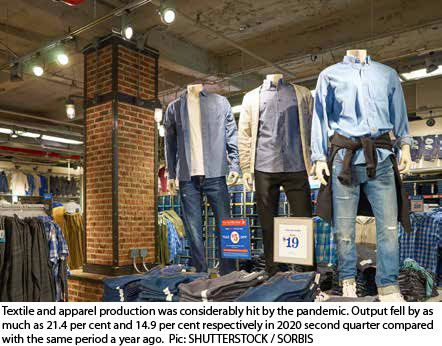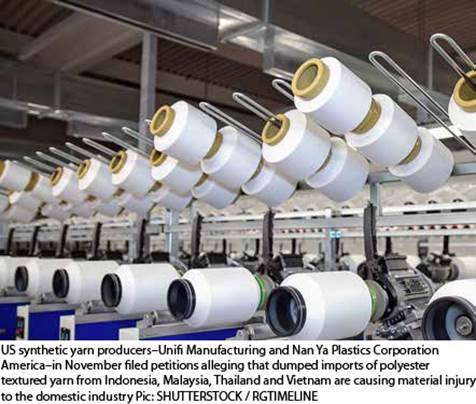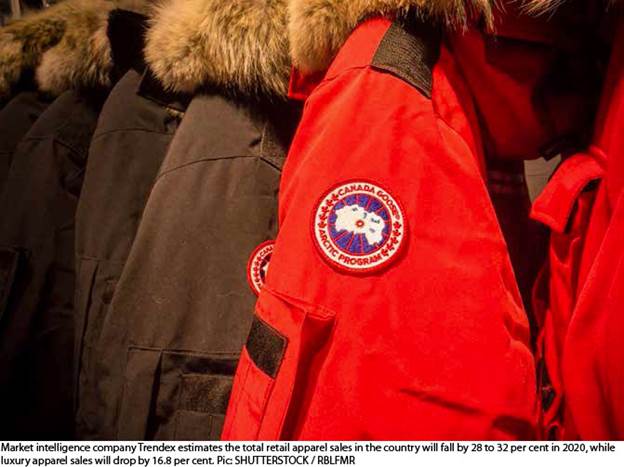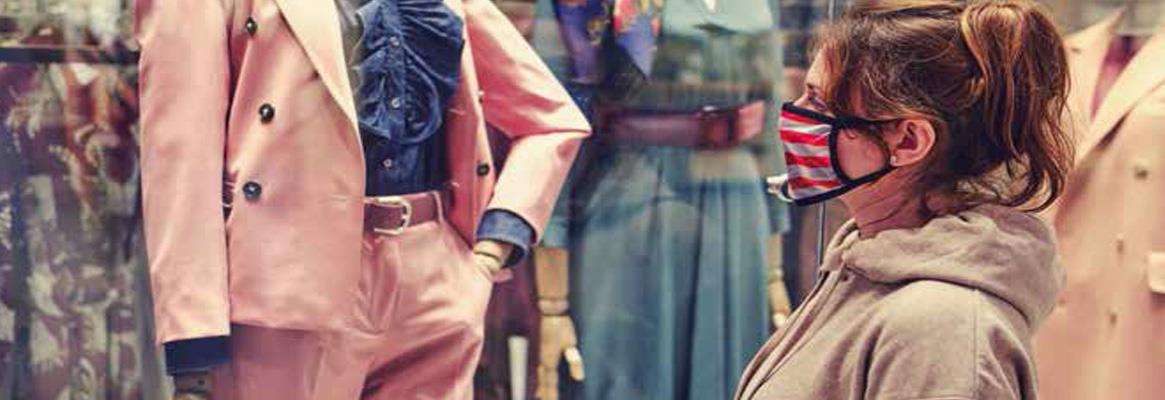The three major players in garment and textiles in North America are the United States, Canada and Mexico, supplemented by Panama, El Salvador, Guatemala and Caribbean neighbours like Haiti. Fibre2Fashion takes a look at the two large countries in the continent.
The United States-Mexico-Canada Agreement (USMCA) went into effect from July 1. It replaced the North American Free Trade Agreement (NAFTA). Reached after more than two years of talks, it sought to change Mexico's labour rules so that workers could enjoy the freedom to form unions and bargain for better wages. The American Federation of Labour and Congress of Industrial Organisations (AFL-CIO) said many improvements must be made to fulfill USMCA promises.
Mexico, a key supplier of apparel and textiles to the United States and importer of Chinese textile and clothing, has assumed higher significance for the US market after USMCA signing.
The textile and apparel rules of origin in USMCA are generally based on the 'yarn forward' rule, which warrants the yarn formation (spinning or extruding) and all processes following that to occur in the USMCA territory. Yarn too is generally subject to a similar 'fibre-forward' rule. However exceptions have been provided to allow use of foreign-origin fabric or yarns for specific products or when those are in short supply in the territory;
After certain specific transition periods, designated narrow elastic fabric, sewing thread and pocket bag fabric must meet the specified rules of origin requirements for each component and certain foreign-origin rayon fibre and rayon filaments may be used in textile and apparel goods, provided those meet all other applicable requirements. Apart from normal verification procedures, USMCA has incorporated the concept of 'jump visits', which allows strengthening customs enforcement and preventing fraud.
Meanwhile, garment factories close to the United States aiming to steal a share from Chinese manufacturers must address fabric production infrastructure and expand into more categories if they hope to convince brands to relocate, according to data analytics company GlobalData, which said few such firms have managed to successfully shift production out of China at scale.
Let us now take a look at the two large countries in the continent:
United States: Concern Over Sanctions Against Prc Entities
The US Senate in January approved the USMCA, which was signed by President Donald Trump in November 2018. A White House statement called the step 'another trade win for American workers', replacing 'the job-killing, huge failure NAFTA'. The National Retail Federation (NRF) and the National Council of Textile Organisations (NCTO) lauded the passage.
In February, the US administration removed 25 nations from its list of developing nations, depriving those of preferential treatment in trade. The countries are either members of G-20, the Organisation for Economic Cooperation and Development (OECD), or are categorised as high-income nations by the World Bank. The countries are Albania, Argentina, Armenia, Brazil, Bulgaria, China, Colombia, Costa Rica, Georgia, Hong Kong, India, Indonesia, Kazakhstan, the Kyrgyz Republic, Malaysia, Moldova, Montenegro, North Macedonia, Romania, Singapore, South Africa, South Korea, Thailand, Ukraine and Vietnam.
US and Chinese negotiators had telephonic discussions in August about their Phase One trade deal. The two sides signed the accord in January, leading to a partial truce in their trade war. A US government statement said the parties "addressed steps that China has taken to effectuate structural changes called for by the agreement."
Earlier in the year, the National Cotton Council (NCC) said the Phase One trade deal could boost cotton exports. With global cotton use forecast down and production largely unaffected, 2020-21 ending stocks are forecast higher by the US Department of Agriculture at 97.5 million bales, 19 per cent above its estimate in the February 2020 outlook.
More than the pandemic, the US-China trade war remained a key challenge to the US apparel and footwear sector as despite the Phase One deal, 92 per cent of apparel, 51 per cent of footwear, 68 per cent of home textiles and all travel goods imported from China still attracted an additional punitive tariff of 7.5-25 per cent on top of the already high duties, the American Apparel and Footwear Association (AAFA) said in July.
President Trump in October signed into law the 'Extension of the Caribbean Basin Economic Recovery Act (CBERA)', which offers preferential duty treatment to some apparel items imported from certain Caribbean countries. The act extends the CBERA till 2030 and is retroactive to September 30, 2020, when the underlying legislation expired. CBERA was launched in 1983 to facilitate economic development and promote economic diversification in the Caribbean region. In 2000, the Caribbean Basin Trade Partnership Act (CBTPA) expanded the access offered by CBERA to additional goods, including apparel. The legislation signed on October 10 extends the CBTPA provisions of CBERA as well.
Haiti was a key nation that advocated the renewal of the CBTPA on behalf of the Caribbean region this year. In a statement, the Haitian embassy in Washington, DC, said the step will enable eligible countries to compete with China and other Asian apparel suppliers.
Washington imposed several sanctions this year on Chinese entities citing human rights abuse on minority Muslim Uyghurs in the Xinjiang Uyghur Autonomous Region (XUAR). In July, it issued an advisory saying companies doing business in Xinjiang or with entities using Xinjiang labour could be exposed to 'reputational, economic and legal risks'.
In September, the Customs and Border Protection (CBP) issued five withhold release orders (WROs) on products, including apparel and cotton, imported from China that are produced with state-sponsored forced labour in XUAR, where, Washington said, Beijing "is engaged in systemic human rights abuses against the Uyghur people and other ethnic and religious minorities".
The products blocked included apparel produced by Yili Zhuowan Garment Manufacturing Co. and Baoding LYSZD Trade and Business Co., cotton produced and processed by Xinjiang Junggar Cotton and Linen Co., and hair products made in the Lop County Hair Product Industrial Park, all in XUAR. CBP said it had identified indications of use of forced and prison labour by these companies. All products made with forced labour from the Lop County No. 4 Vocational Skills Education and Training Center in XUAR were blocked.
On December 2, CBP issued another WRO against cotton products made by the Xinjiang Production and Construction Corps (XPCC) that could affect a significant share of all US textile imports from China and possibly other cotton products from non-Chinese sources that are made from cotton or cotton items originating with XPCC. It could also affect many US retailers and consumers as XPCC reportedly accounts for about a third of the cotton and cotton goods production in Xinjiang. The US government claims XPCC is a paramilitary group.
"This order will likely impact the supply chains of virtually every major apparel retailer-from Amazon, to Target, to Zara," Worker Rights Consortium (WRC), a labour rights watchdog, said.
The House of Representatives almost unanimously passed the Uyghur Forced Labor Prevention Act, which aims to curb imports from the region. Under the bill, goods manufactured or produced in Xinjiang will not be allowed into the United States unless CBP determines they were not made by forced or indentured labour.
The US government in July announced a 25 per cent tariff on $1.3 billion worth of French merchandise, including handbags, after France levied a digital service tax on US technology companies that the former perceived as unfair.
Brazil and the United States signed a new protocol relating to trade rules and transparency that updated the 2011 Agreement on Trade and Economic Cooperation (ATEC) with three new annexes comprising provisions on customs administration and trade facilitation, good regulatory practices and fighting corruption.
COVID-19's impact
As the COVID-19 pandemic raged across the country, the government implemented lockdowns and initiated policy measures to absorb its detrimental impact on the economy and industry, including a $3-trillion rescue package to stimulate the economy. It allowed deferred tariff payments 'for importers suffering significant financial hardship because of COVID-19'. The office of the US Trade Representative in March excluded dozens of medical products imported from China, including face masks, hand sanitising wipes and examination gloves, from import tariffs.
Close to 84,000 jobs were lost in the US textile and apparel manufacturing sector between March and April, four-fifths of which returned by September. Many big US fashion retailers went bankrupt. In September, Goldman Sachs said nearly all US apparel companies have moved or plan to move at least part of their operations out of China.
Several US clothing retailers and companies took a variety of actions to face the situation arising out of the pandemic. The steps included reducing store hours, closing select stores, encouraging customers to shop online, implementing 'work from home' options, staff travel restrictions and enhanced continued pay for employees.

Retailer JCPenney Company, Tailored Brands, Italian luxury brand Furla's US subsidiary and Neiman Marcus filed for bankruptcy protection, while L Brands announced Victorias's Secret would permanently close 250 stores in the United States and Canada in 2020. L Brands also plans to permanently close 50 US stores of Bath & Body Works and one in Canada.
Mid-priced US department store chain Kohl's Corp decided to remove eight brands, including Juicy Couture, Popsugar, Jennifer Lopez, Dana Buchman, Mudd, Rock & Republic and Elle, from its stores as it foresaw a continued weakening demand for women's apparel. Nike expects to cut 700 jobs at its Oregon headquarters by January 2021 as part of a restructuring it announced last summer.
A coalition of iconic American apparel brands and textile companies, responding to the urgent call of the White House for medical supplies, came together to quickly build a supply chain and fast-track the manufacturing of medical face masks to help hospitals, healthcare workers and citizens battling the spread of the COVID-19 disease. Yarn spinner Parkdale led the effort. Companies, like Ralph Lauren Corporation and Capri Holdings committed funds for COVID management.
Textile and apparel production was considerably hit by the pandemic. Output fell by as much as 21.4 per cent and 14.9 per cent respectively in 2020 second quarter compared with the same period a year ago. As exports and manufacturing are interlinked, manufacturing too reduced, and in the first seven months of the year, yarn and fabric exports went down by 31 per cent and 19 per cent respectively year over year, according to the Office of Textiles and Apparel (OTEXA).
Corporate developments
The Fashion Footwear Association of New York (FFANY) and the Footwear Distributors and Retailers of America (FDRA) merged from October 1, with FFANY members automatically becoming FDRA members.
Parkdale Mills subsidiary US Cotton, the nation's largest manufacturer of cotton swabs, collaborated with the Food and Drug Administration, the Gates Foundation, the UnitedHealth Group and Quantigen to step up production of spun synthetic swabs, needed to diagnose COVID-19. US Cotton has developed a fully synthetic, polyester-based Q-tip-type swab. The FDA announced that these synthetic swabs-with a design similar to Q-tips-could be used to test patients for the coronavirus.
The US Agency for International Development announced in October an MoU with a consortium of US retail, apparel and footwear companies and industry associations to pursue much-needed relief over the next year to the predominantly female workers in their supply chains in Bangladesh, Cambodia, Sri Lanka and Vietnam. The participating companies and industry associations are Carter's, Gap, Global Brands Group, Levi Strauss, Nike, Tapestry, Target, VF Corporation, Walmart, AAFA, NRF, the Retail Industry Leaders Association and the US Fashion Industry Association.
The Los Angeles county board of supervisors in November approved a programme in which workers from certain sectors, including apparel, will form public health councils to help ensure employers follow pandemic safety rules. The board also asked for an ordinance to protect workers from retaliation as safety issues are rarely expressed due to fear of being fired.
Gap announced to work collaboratively with its vendors to compensate them in full for finished goods and goods in production that were cancelled or subject to pack and hold. It also extended payment terms on certain orders and is providing low-cost financing to suppliers. VF Corporation claimed paying its suppliers as per normal terms and conditions for all orders that had already been produced.
Omni-channel specialty menswear retailer Tailored Brands sold the Joseph Abboud trademarks to WHP Global. It will use the proceeds for debt repayment. PVH Corp decided to sell its Speedo North America business to the Pentland Group, parent company of Speedo International Limited. The Pentland Group, which also owns the Berghaus, Canterbury, Ellesse and SeaVees brands, acquired performance swimwear brand Speedo in 1991.
The H&M Group signed a franchise agreement in January with Hola Moda SA in central America. The first H&M store is set to open in Panama by the end of 2020. Hola Moda operates global fashion brands in 15 countries across the region.
The Authentic Brands Group (ABG), a global brand development, marketing and entertainment company, the Simon Property Group and Brookfield Property Partners became joint owners of Forever 21 by acquiring the fast fashion retailer, which in January had announced its e-commerce strategy targeting consumers in the Asia Pacific, Latin America and Canada. Forever 21 filed for bankruptcy protection in 2019 and shut 350 of its 815 global stores, blaming substantial real estate cost and lagging innovation and sustainability efforts for its troubles.
Tempur Sealy International, which develops, manufactures, and markets mattresses and other products, announced plans to open its 30th North American manufacturing facility. This newest facility is expected to open in the first quarter of 2021 and result in three new manufacturing facilities opening within a six-month period. Walmart announces the launch of a new fashion brand 'Free Assembly' while Kontoor launched Wrangler in China.
Two major US synthetic yarn producers-Unifi Manufacturing and Nan Ya Plastics Corporation America-in November filed petitions alleging that dumped imports of polyester textured yarn from Indonesia, Malaysia, Thailand and Vietnam are causing material injury to the domestic industry. The purpose was to establish conditions of fair competition in the US market. The petitioning domestic producers have asked the US government to investigate the dumping and injury and to impose anti-dumping duties on the imports of polyester textured yarn from the four countries.

Tempur Sealy International, which develops, manufactures and markets mattresses and other products, announced plans to open its 30th North American manufacturing facility. This newest facility is expected to open in the first quarter of 2021 and result in three new manufacturing facilities opening within a six-month period. Walmart announces the launch of a new fashion brand 'Free Assembly' while Kontoor launched Wrangler in China.
Two major US synthetic yarn producers-Unifi Manufacturing and Nan Ya Plastics Corporation America-in November filed petitions alleging that dumped imports of polyester textured yarn from Indonesia, Malaysia, Thailand and Vietnam are causing material injury to the domestic industry. Wanting conditions of fair competition in the US market, the petitioners have asked the US government to investigate the dumping and injury and to impose anti-dumping duties.
Hemp Traders unveiled hemp knit fabrics for Americans-the first time since hemp prohibition that US-made hemp fabrics are available to people. The fabrics will be produced and dyed in Los Angeles. Three types of fabric are being produced - Jersey for t-shirts, French Terry for sweatshirts and sweatpants, and Rib Knit for accessories and apparel.
Sustainability
Despite the pandemic, sustainability is now business critical for many top brands. Research by the US Cotton Trust Protocol and the Economist Intelligence Unit showed 60 per cent of fashion, retail and textile leaders from the US and Europe named implementing sustainability measures as the second top strategic objective for their business, the top being improving customers' experience (ranked first by 64 per cent).
Non-profit Textile Exchange launched the new revamped version of Material Change Index (MCI) 2020. With 170 companies participating, MCI is the largest voluntary peer-to-peer comparison initiative in the textile industry. MCI tracks the apparel, footwear, and home textile sector's progress toward more sustainable materials sourcing, as well as alignment with global efforts like the US Sustainable Development Goals and the transition to a circular economy. The non-profit also launched the Organic Content Standard 3.0 after concluding a regular revision process. The standard is used to verify organically grown raw materials from the farm to the final product.
The US Cotton Trust Protocol welcomed in December the first ten US cotton textile manufacturers-Buhler Yarns, Cap Yarns, CCW, Contempora Fabrics, Cotswold Industries, Frontier Yarns, Hamrick Mills, Inman Mills, Parkdale, Swisstex Direct-as members. The membership lets manufacturers prove they are approved supply chain partner for retailers sourcing sustainably grown cotton.
Delta Apparel joined the Cotton Leads programme, which was founded by an alliance of US and Australian industry organisations to raise awareness about sustainable and responsible cotton growing practices.
Gap collaborated with fashion resale platform thredUP to encourage customers to turn in second hand clothes in exchange for shopping credit to be redeemed at Gap, Banana Republic, Athleta, or Janie and Jack. While Lee announced its first-ever global sustainability goals, Wrangler announced plans to halve its water usage by 2030.
Under pressure from Green America and its members, baby clothes retailer Carter's took steps to limit toxic chemicals in its supply chain. These include releasing a restricted substances list, disclosing information about energy usage and waste reduction, and providing greater transparency on human rights in its supply chain.
GS1 US in November published the 'Best Practice Guideline for Sustainability in Packaging Materials', created by apparel and general merchandise leaders to help the industry incorporate sustainable packaging practices in the supply chain. It offers guidance on the selection of packaging materials and processes to minimise non-recyclable waste.
Future
Textile products had accounted for over 66 per cent of the total output of the US textile-apparel industry in 2019, up from 58 per cent in 1998, according to Bureau of Economic Analysis. 'Made in the USA' (MUSA) products are gaining traction in many emerging high-tech segments like medical textiles, protective clothing, specialty and industrial fabrics and non-wovens. Employment in the sector has been declining over the years.
The Federal Trade Commission (FTC) published a proposed rule for MUSA claims for labels in July. It has also proposed to repeal its trade regulation on apparel care labelling. FTC said the apparel care labeling may be unnecessary as manufacturers would likely continue to provide care information to consumers.
In 2019, the US enjoyed a $1,633million trade surplus in textiles and suffered an $80,637 million trade deficit in apparel, and therefore, raising apparel export remains a challenge along with rising unemployment in the sector that is witnessing higher levels of automation.
According to US trade data, for the first nine months of 2020, only 9.1 per cent of US apparel imports came from members of the Dominican Republic-Central America Free Trade Agreement (CAFTA-DR), down from 10.3 per cent in 2019, while 4.4 per cent came from members of the USMCA, down from 4.5 per cent in 2019. That implies China still holds the lion's share of the US apparel market (its share was 39.93 per cent in 2019). It is to be seen whether policy changes in the new administration in 2021 changes this trend.
Statistics
- Import of apparel-textiles fell by 24.47 per cent to $64.794 billion in January-September, 2020, compared to $85.788 billion in the same period in 2019; With 28.12 per cent share, China was the largest supplier, followed by Vietnam with 14.88 per cent share; Apparel imports were worth $47.029 billion during the nine-month period
- ReportLinker estimates the US textile market in 2020 at $254.9 billion
- In 2019, US textile-apparel imports increased by 0.28 per cent YoY to $111.208 billion, with apparel alone accounting for $83.806 billion
- Textile manufacturing output (measured by value added) totaled $18.79 billion in 2019, in which US enjoyed a $1,633-million trade surplus in textiles and suffered a $80,637-million trade deficit in apparel; apparel manufacturing dropped to $9.5 billion in 2019
- Canada and Mexico combinedly contributed to $11.3 billion worth US textile-apparel imports in 2019
Canada: Fashion Sector Severely Hit
Canada's textile industry, which began with the manufacture of yarns and fabrics from natural fibres, is located mainly in Quebec and Ontario. It is heavily capital-intensive, uses natural, artificial and man-made fibres and filaments, and supplies a wide range of value-added products. The country is one of the largest export markets for the US textile and apparel industry.

The country's fashion sector has been severely hit by the pandemic. Market intelligence company Trendex estimates the total retail apparel sales in the country will fall by 28 to 32 per cent in 2020, while luxury apparel sales will drop by 16.8 per cent. As in any other country, Canadian domestic manufacturers shifted to PPE production for frontline health workers.
Among the companies that filed for bankruptcy protection were Le Chateau Inc, specialty retailer and manufacturer of exclusively designed apparel, footwear and accessories, apparel retailer Reitmans (Canada) Ltd. and Chico's FAS Canada, a subsidiary of US women's clothing and accessories retailer Chico's FAS.
The Canada Emergency Response Benefit (CERB) allotted CAN $2,000 a month for up to four months for workers who lost their income due to the pandemic. It will offer financial aid to people who have lost their jobs, are quarantined, caring for someone infected and to parents who have to stay home to take care of kids.
The United Kingdom and Canada signed a trade agreement in 2020 that secures transatlantic trade and comes into effect on January 1, 2021. Both countries also agreed to negotiate a new, tailor-made UK-Canada trade deal in 2021.
Canada, as part of the G20, implemented between mid-October 2019 and mid-May 2020 several new trade and trade-related measures that were both import-facilitating and import-restrictive in nature, according to the World Trade Organisation, which found dozens of these measures linked to the COVID-19 pandemic.
Several fashion brands, including Stitch Fix, The Very Group and Saloni, joined Canopy Planet's Pack4Good initiative to tackle the extensive impact paper packaging is having on the world's forests, biodiversity and climate. They will develop holistic, innovative packaging solutions to reduce waste and keep forests standing.
The Retail Council of Canada and the Association of Footwear Apparel Canada in August announced a partnership with a mandate to build a united platform for the retail and supplier community. The goal is to support the critical ecosystem of independent retailers and suppliers within the fashion category of footwear, apparel, and accessories.
Researchers at UBC Okanagan and outdoor apparel giant Arc'teryx created non-toxic oil and water-repellent performance textile finishes. Outdoor fabrics are typically treated with perfluorinated compounds (PFCs) to repel oil and water. But PFCs pose risk to health and the environment. The new fabric finish can be made from biodegradable materials. The research was published in Nature Sustainability journal.
Winter clothing manufacturer Canada Goose committed to sustainability by pledging to reach 90 per cent Bluesign-approved fabrics by 2025. 2nd Skin, which specializes in printed promotional material, acquired the textile division of Id pro, a major screen printing production centre. With this, 2nd Skin is now the largest textile printing company in Eastern Canada and is looking to further expansion.
Duvaltex, the North American leader for contract textiles, shifted its True, Victor and Teknit brands to the Duvaltex brand. Such a streamlining, it claimed, will lead to more sustainable solutions.
ReportLinker projected the textile market in Canada to grow at 2 per cent CAGR between 2020 and 2027.
This article was first published in the January 2021 edition of the print magazine.








Comments